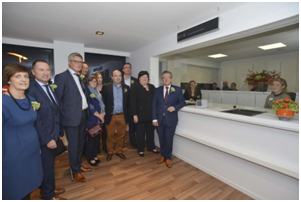The question of who should triage patients over the phone is critical to delivering safe and effective care and has become a contentious issue for healthcare systems. Belgium is currently undergoing important changes in how it provides healthcare to patients in this respect.

out-of-hours care centre in Bruges hospital
On 21 October 2016, Maggie De Block, the Belgian minister for health, opened a new out-of-hours healthcare centre in Bruges, one of the first in Belgium to be located in the same place as a hospital emergency department. On the same day, a study led by the University of Antwerp began testing telephone triage in Belgium for the first time. In doing so they will be using professional call takers with no clinical training.
Hilde Philips at the University of Antwerp is leading the research. The aim is to determine if specific protocols are safe and efficient for professional call takers to triage patients with non-urgent medical problems over the phone. If the protocols are validated, the federal government of Belgium plans to roll out telephone triage nationally in 2017 using professionals with no clinical training.
However, research conducted in the UK has shown that using clinical protocols to deliver triage is not a straightforward matter of following instructions. My own research at the University of East Anglia identified evidence of computer decision support software adversely affecting nurses’ communication with patients. This evidence included patients struggling to communicate their problem in the format required by the software; nurses attempting to obtain answers from patients that did not reflect their symptoms, leading to inaccurate documentation; and nurses ignoring patient’s suggestions about treatment and diagnosis as they were preoccupied with completing software tasks.
Similarly, studies of non-clinical call handlers working in the UK’s NHS 111 service have also shown how call handlers use “pseudo-clinical” expertise to direct and advise patients. Notions that employing non-clinicians will save the NHS money also appear to be ill founded, with evidence of NHS 111 increasing the use of ambulance services.
While telephone triage is increasingly being used internationally to manage the demand for healthcare, typically nurses are used instead of non-clinicians. For example, in Denmark doctors triage patients, except in Copenhagen where for the past few years nurses have been used. In contrast, the Netherlands employs nurses to deliver a national triage service, but they are supervised by GPs. Currently, it is only the UK that sees non-clinical call handlers triage patients over the phone.
The available evidence so far suggests that assumptions of non-clinical call handlers unquestionably following clinical protocols to deliver telephone triage are misplaced. Instead, it may be safer to trust the clinical expertise of well trained nurses, who know how to communicate and obtain accurate information from patients over the phone.
While the University of Antwerp may find that in principle clinical protocols are safe to use, the Belgian and UK governments would be prudent to reconsider the notion that non-clinical professionals represent a safe and cost effective way to manage the demand for care over the phone. Future research may be best placed comparing how professionals and nurses communicate with patients over the phone and the impact these different approaches have on emergency care.
 Jamie Murdoch is a research fellow in process evaluation methodology at the University of East Anglia. He has recently completed a study of nurse led versus GP led telephone triage communication in primary care. Dr Murdoch met Maggie De Block at the opening of the new out-of-hours centre, where he shared his findings on computer mediated nurse triage.
Jamie Murdoch is a research fellow in process evaluation methodology at the University of East Anglia. He has recently completed a study of nurse led versus GP led telephone triage communication in primary care. Dr Murdoch met Maggie De Block at the opening of the new out-of-hours centre, where he shared his findings on computer mediated nurse triage.
Competing interests: I have read and understood BMJ policy on declaration of interests and declare the following interests: I am collaborating with Hilde Philips at the University of Antwerp to develop a funding bid on the delivery of out-of-hours care across Europe. This is an unpaid collaboration.
